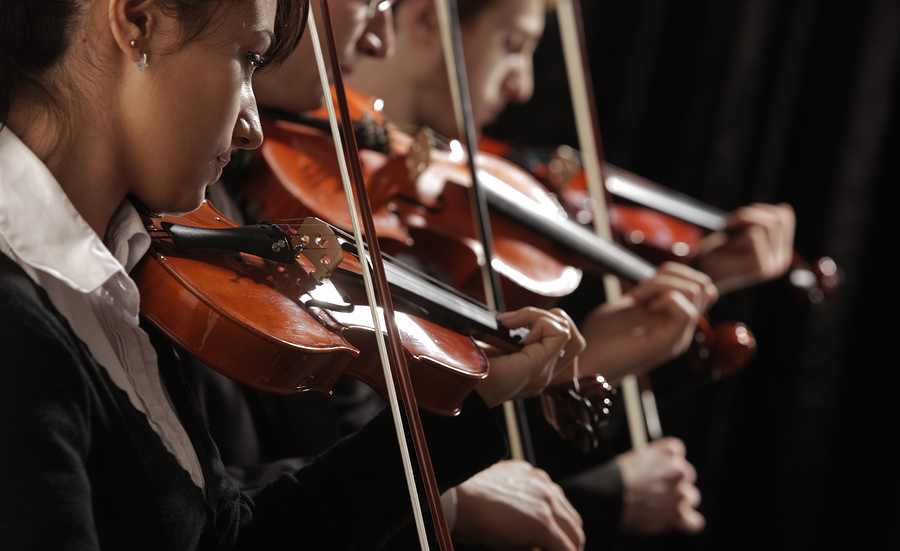Could classical music be the soothing tonic you need right now?
More and more of us are finding comfort and calm by tuning into classical during the pandemic.
I can’t really tell Bach from Beethoven. I’ve no handle on facts about Handel and draw blanks on Brahms. Yet, classical music has become a cherished part of my routine – and it’s hard to imagine getting through a working day without it.
Right now, it seems I’m not the only one. The pandemic has prompted all sorts of activities and behaviour shifts, as we seek to adapt and find glimmers of comfort in the ‘new normal’ – which for 85% of people, includes discovering new music, according to a new poll by the Royal Philharmonic Orchestra. Nearly a third (30%) of these say this means learning more about classical, opera and chamber music.
Since the start of lockdown, the Royal Philharmonic Orchestra’s website has seen a 290% rise in traffic and social media engagement up 755%.
This week, they launched #RPOatHome, and Wednesday (April 8) saw their first streamed performance, with newly appointed music director Vasily Petrenko conducting Strauss’ Ein Heldenleben – broadcast in partnership with Google Arts and Culture, YouTube and in association with London’s Southbank Centre.
Thank you to all who watched the online concert premiere of Strauss’ Ein Heldenleben! It’ll be available on YouTube until 4pm tomorrow https://t.co/yfOEKnSpxx 🎶🎶🎶#RPOatHome @SouthbankCentre @googlearts pic.twitter.com/TaUAgVH4E7
— Royal Philharmonic Orchestra (@rpoonline) April 8, 2020
“In these unprecedented times, music is often seen as a good tonic to cope with stress and uncertainty,” says James Williams, Royal Philharmonic Orchestra managing director. “The silver lining to our current situation is that, with all this additional time comes a great opportunity to learn more about the music people love. Orchestral music is a rich pool to dip into, there is so much to explore, and it will continue to surprise and delight for far longer than the time we will be in isolation.
“While live concerts are off for the time being, we’ve found other ways to ensure anyone can keep enjoying the amazing sound of the Royal Philharmonic Orchestra, anywhere in the world. We hope it brings comfort to those that need it, as well as a reminder of wonderful performances to come once coronavirus isolation is over.”
Classic FM, the UK’s most popular classical music station, has also seen a spike in audience figures. The station’s total digital listening hours rose by 12% for March compared to February, and their social media reach has already doubled.
“It’s a privilege for us at Classic FM to share our passion for classical music with millions of people across the UK who, in return, share their lives with us. Whether Classic FM is part of the family home or we’re company for someone who’s on their own, we have always felt like a community,” says Classic FM presenter Sam Pittis.
“At a time when many people are self-isolating and working from home, that community has never felt more vital. Thousands of our listeners have been getting in touch to say what a comfort classical music is to them during these challenging times. We’ve also had messages from NHS workers, delivery drivers and supermarket staff who have spoken about the uplifting benefit of classical pieces while they are working so hard to help us all.
“Whether it’s a favourite piece by one of the ‘greats’ such as Mozart or Beethoven, a modern day piece by one of today’s composers such as Ludovico Einaudi or a film score by John Williams, classical music continues to provide some much-needed musical escapism and comfort for millions of people.”
My classical music habit began in a bid to improve my concentration when I started working from home a few days a week a few years ago. As a real ‘office person’ who often has ants in their pants, willpower alone was never going to cut it. I needed a stay-focused toolkit – and classical music proved so effective (and accessible, thanks to Spotify) that it now ranks alongside coffee, kitchen breaks and using a real paper diary as one of my working essentials.
There’s something uniquely calming about classical music. Even those rousing crescendos make for super-soothing background music, and because there’s no lyrics, my attention never wanders from whatever task I’m tackling on my screen.
It’s something that’s long fascinated researchers, and studies have found these effects to be physiologically measurable too. Sound vibrations (certain frequencies more than others) don’t just trigger our auditory nerves, enabling us to process sound. They also stimulate the vagus nerve – one of the longest and most important nerves in the body which plays a key role in the autonomic nervous system (controlling vital processes that happen without conscious thought, like heartbeats), and there’s growing understanding around how our bodies and minds are intrinsically linked.
If you find classical music meditative, calming, or that it makes you happy or experience a rush of emotion – that’s not just a spiritual response or because it tickles your auditory taste buds. It’s because it’s sparking chemical changes in your body and brain that alter our emotional state.
Some studies have linked listening to classical music with feeling more relaxed, alongside measured ‘calmed’ responses in the body and brain. Others have found it helps calm blood pressure after stress, can be an effective pain management tool, and benefit people with depression. It’s even used in urban train stations to help reduce antisocial behaviour and crime.
Right now, with life as we know it flipped on its head and so much out of our control, being able to hold on to any small consistencies where we can is more important than ever. Small daily comforts and routine rituals are what keep us ticking along, like heartbeats for the soul, and you don’t need to be an expert to feel the music.
Do you listen to classical music regularly?
The Press Association
Latest posts by The Press Association (see all)
- Best places to see bluebells this spring - April 2, 2025
- Does sunscreen expire? Everything you need to know about SPFs - April 2, 2025
- Top Gun and Batman star Val Kilmer dead at 65 - April 2, 2025
- Actor Richard Chamberlain dies aged 90 - March 30, 2025
- 5 new books to read this week - March 26, 2025




















